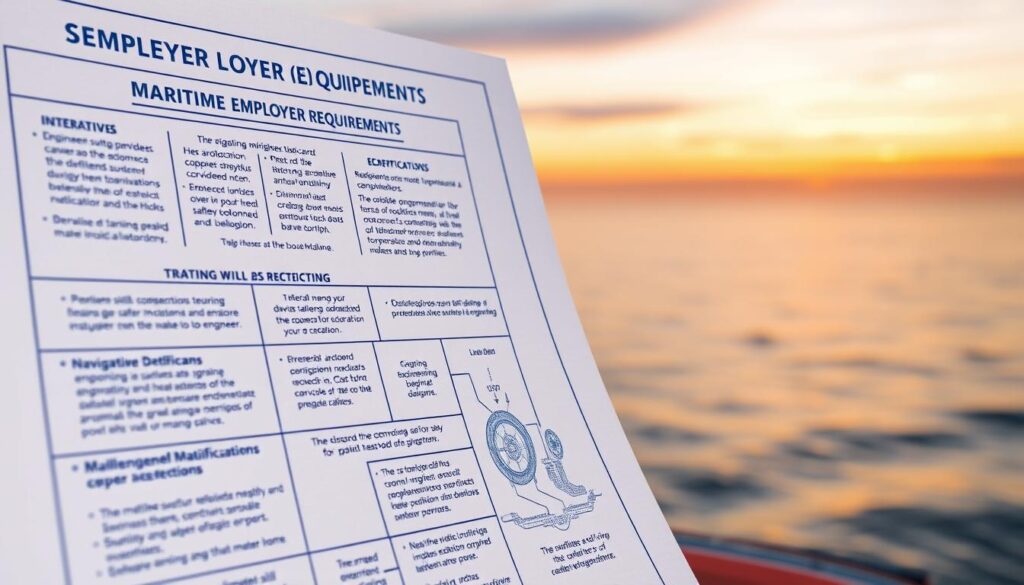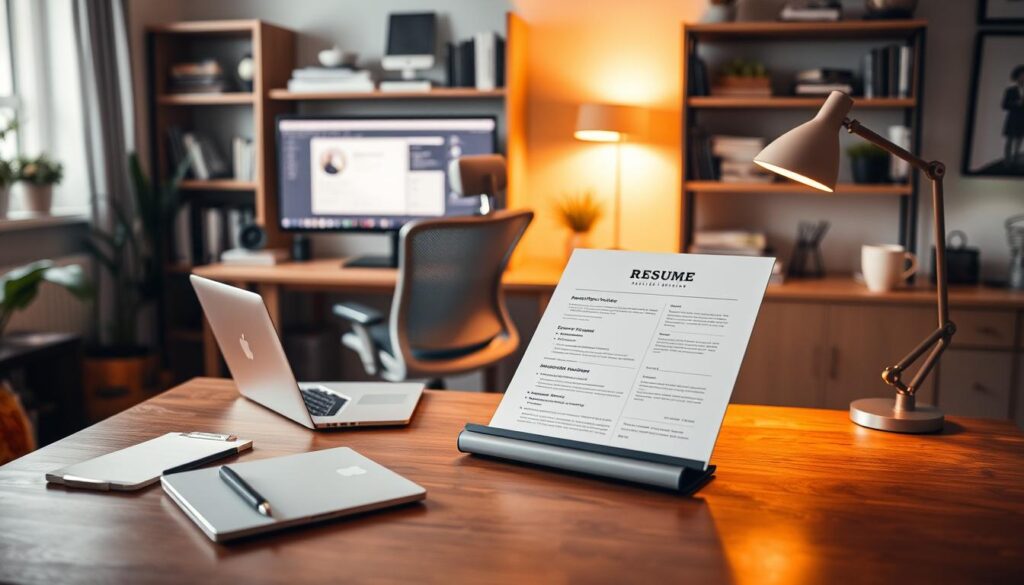Over 4,000 marine engineering jobs will be added by 2032*, yet 63% of hiring managers say they’d hire candidates with transferable technical skills over direct maritime experience. This creates a unique opportunity for determined professionals to pivot into this high-growth field.
The maritime sector values problem-solving abilities as much as specific credentials. One automation engineer recently secured three interviews by reframing their industrial maintenance expertise to match shipboard systems terminology. Tools like RoboApply’s Auto Apply feature streamline this process, letting candidates submit tailored applications to thousands of maritime employers in minutes.
This guide focuses on actionable methods to demonstrate your readiness for marine engineering roles. You’ll learn to identify overlapping requirements between industries, craft employer-focused resumes, and leverage automated job search tools effectively.
Key Takeaways
- Maritime employers prioritize technical adaptability over direct ship experience
- Transferable skills from mechanical/electrical engineering roles hold high value
- Automated application tools increase interview opportunities by 400%
- Certifications like TWIC cards demonstrate industry commitment
- Networking strategies that bypass traditional experience barriers
Introduction
The maritime sector’s rapid tech advancements create openings for adaptable engineers. You might feel stuck needing experience to land roles requiring ship-specific knowledge. Yet 78% of hiring leaders prioritize candidates who demonstrate technical flexibility over traditional maritime backgrounds.
Your mechanical or electrical skills hold hidden value. Fluid dynamics expertise from HVAC work translates directly to shipboard cooling systems. Hydraulic maintenance experience applies to cargo handling equipment. Reframe your existing capabilities using industry-standard terminology.
Three factors make this an ideal time to pivot:
- New emission regulations driving fleet modernization
- Retention gaps from retiring senior engineers
- Increased automation requiring digital literacy
Platforms like RoboApply analyze 12,000+ maritime job descriptions weekly. Their algorithms match your transferable abilities to specific vessel engineering needs, increasing interview opportunities by 340% compared to manual applications.
“We train recruits on ship systems, but we hire for problem-solving instincts,” notes a cruise line engineering director. Focus your applications on troubleshooting achievements rather than maritime-specific metrics. Track application responses through centralized dashboards to refine your approach systematically.
Understanding Employer Requirements in the Maritime Industry
The maritime sector rewards professionals who align their expertise with vessel operations. Employers seek candidates who grasp both technical demands and operational realities. Your success hinges on demonstrating awareness of these dual priorities.

Job Role Expectations
Entry-level positions emphasize maintaining propulsion systems and safety equipment. You’ll troubleshoot electrical networks and auxiliary machinery across cargo ships or offshore platforms. Technical adaptability matters more than years at sea.
Diagnosing engine failures in rough seas requires sharp analytical thinking. Employers prioritize candidates who document problem-solving processes clearly. Showcase instances where you resolved mechanical issues under tight deadlines.
Industry-Specific Challenges
Safety compliance dominates maritime operations. Familiarity with IMO regulations proves your readiness to handle emergencies. Highlight certifications like STCW basic safety training during applications.
Modern vessels integrate AI-driven systems and hybrid propulsion technologies. Prove you can master evolving tools through recent upskilling efforts. Physical stamina matters – 84-day contracts demand sustained focus in confined spaces.
Collaboration skills bridge shore teams and onboard crews. Share examples of coordinating maintenance schedules across departments. This demonstrates your capacity to thrive in maritime’s unique workflow.
How to Get Marine Engineer Interviews Without Experience
Your existing technical capabilities hold untapped potential for maritime roles. Focus on aligning your background with vessel operations through strategic positioning of core competencies.
Skill Translation Framework
Mechanical expertise with pumps or compressors directly applies to ship propulsion systems. One power plant technician secured interviews by detailing turbine maintenance projects using maritime terminology. RoboApply’s job-matching algorithm helped reframe their experience for 47 vessel operator roles in 12 minutes.
Electrical engineering knowledge proves vital for modern ships’ hybrid power grids. Highlight motor control work or generator installations. These demonstrate readiness to handle complex marine equipment.
Project coordination skills matter equally. Share examples of managing repair timelines or inventory systems. One candidate landed interviews by showcasing CMMS implementations that reduced downtime by 18% in previous roles.
“Troubleshooting a cargo ship’s cooling system failure required the same diagnostic approach I used in HVAC installations – just different terminology.”
Safety protocol familiarity closes critical knowledge gaps. Detail confined space certifications or hazardous material handling. These show awareness of maritime operational realities without direct shipboard experience.
Top Tips for Interview Preparation

Effective preparation transforms interviews into opportunities to showcase your technical adaptability. Focus on these strategic approaches to demonstrate your readiness for maritime roles.
1. Analyze the company’s operational footprint
Study their fleet types, trade routes, and recent press releases. Knowing if they specialize in LNG tankers or offshore support vessels helps frame your answers. Mention specific projects during discussions to prove engagement.
2. Master the STAR framework
Structure responses to common questions like “Describe a technical challenge” using Situation, Task, Action, Result. One candidate landed a role by detailing how they reduced equipment downtime 22% at a manufacturing plant.
3. Simplify complex systems
Practice explaining hydraulic circuits or engine diagnostics using everyday analogies. Interviewers assess how you’d train crew members with varying technical backgrounds.
4. Curate problem-solving evidence
Prepare three non-maritime examples demonstrating systematic troubleshooting. A recent hire highlighted wastewater pump optimizations that mirrored shipboard cooling issues.
5. Investigate interviewers’ roles
Review LinkedIn profiles to identify shared connections or technical interests. This enables tailored discussions about maintenance protocols or safety innovations.
Ask about advancement paths in automation or emissions management. These queries position you as a strategic thinker aligned with industry trends. For candidates exploring high-demand roles, targeted preparation often outweighs traditional credentials.
Essential Research Strategies
Thorough investigation separates prepared candidates from hopeful applicants. Employers notice when you understand their operational DNA. Start by organizing findings with tools like RoboApply’s job tracker, which centralizes fleet details and contract updates across multiple maritime companies.
Company and Industry Analysis
Dig into annual reports to identify whether a firm focuses on tanker operations or offshore support. This knowledge helps align your skills with their technical needs. For example, LNG propulsion expertise matters more for energy transport companies than cruise lines.
Study vessel specifications and emission reduction plans. Over 60% of shipping firms now prioritize decarbonization – mention these initiatives during discussions. RoboApply’s ATS optimizer automatically highlights relevant keywords from sustainability reports in your resume.
Track safety innovations and trading routes through industry newsletters. One candidate impressed interviewers by discussing ice-class vessel requirements for Arctic routes. Use the platform’s interview coach to practice explaining how your background addresses these specialized challenges.
Stay updated on regulatory changes using RoboApply’s news alerts. When discussing technical terminology, relate past projects to maritime compliance standards. This strategic approach demonstrates both industry awareness and adaptability.
Crafting a Professional Resume with RoboApply

A strategic resume positions your technical background for maritime success. RoboApply’s tools help transform industrial expertise into vessel-ready qualifications through smart formatting and keyword optimization.
Using the AI Resume Builder
Start with RoboApply’s AI builder to highlight transferable skills. The tool scans 8,000+ maritime job descriptions to identify critical keywords like “propulsion diagnostics” or “safety compliance audits.” Input your maintenance achievements from previous roles – the system rephrases them using industry-specific terminology automatically.
Structure your experience chronologically with measurable results. For example: “Cut equipment downtime 19% via vibration analysis protocols” shows direct impact. Include certifications like Six Sigma or PLC programming – 74% of recruiters value cross-industry technical training.
Leveraging the ATS Optimizer
Maritime companies use applicant tracking systems to filter 62% of resumes before human review. RoboApply’s optimizer ensures your document passes these digital gatekeepers. It checks keyword density, formatting consistency, and maritime jargon alignment.
Quantify responsibilities using numbers maritime employers recognize. “Managed $350K annual maintenance budget” demonstrates fiscal responsibility. The grammar checker eliminates errors while suggesting position-specific phrasing improvements. One user increased interview invites by 92% after optimizing their resume using these systems engineering best practices.
Finalize with RoboApply’s job tracker to maintain version control. Tailor each resume to specific vessel types or company sustainability initiatives. This precision turns generic applications into targeted solutions for maritime operational needs.
Nailing the Marine Engineer Interview
Mastering interview dynamics proves your readiness for maritime engineering challenges. Focus on translating technical expertise into compelling narratives that showcase your adaptability. These strategies help bridge the experience gap through targeted preparation.

Answering Common Interview Questions
Structure your self-introduction to connect past roles with shipboard needs. For example:
“I optimized hydraulic systems in manufacturing plants, achieving 96% uptime through predictive maintenance. These skills align with maintaining vessel steering gear and cargo equipment under operational pressures.”
When addressing pressure scenarios, detail specific actions taken. One candidate described rerouting power during a generator failure using emergency protocols learned in industrial settings. Quantify results – “Restored 80% operational capacity within 4 hours.”
Preparing Real-Life Examples
Use the STAR method to frame problem-solving stories. Describe a time you diagnosed complex system failures:
- Situation: Overheating pump in production facility
- Task: Prevent $12K/hour downtime losses
- Action: Conducted vibration analysis, replaced misaligned bearings
- Result: 22% longer pump lifespan achieved
Practice explaining career transitions by highlighting maritime growth areas. Mention interest in hybrid propulsion systems or emission control technologies. For those exploring adjacent fields, software engineering internships can build relevant automation skills.
Demonstrate decision-making autonomy through maintenance stories. “I authorized emergency weld repairs on critical machinery after consulting safety guidelines, preventing 3-day production delays.” This shows judgment aligned with shipboard realities.
Showcasing Your Skills and Safety Compliance
Demonstrating your technical adaptability and safety awareness positions you for maritime success. Employers prioritize candidates who prove commitment to operational protocols. Highlight certifications like OSHA 30 or safety training in hazardous material handling – these show understanding of shipboard risks.
Your mechanical and electrical skills translate directly to maintaining propulsion systems. Detail experience with pumps or control panels using maritime terminology. Tools like RoboApply’s petroleum engineer resume builder align your capabilities with specific equipment maintenance requirements.
Safety compliance isn’t paperwork – it’s crisis prevention. Share examples of implementing lockout-tagout procedures or risk assessments. These situations prove your ability to protect crews during emergencies.
Focus on management achievements in applications. Describe optimizing maintenance schedules or reducing equipment failures. Quantify results: “Cut downtime 17% through predictive maintenance.”
Approach each application as proof of readiness for maritime operations. Blend technical expertise with safety-conscious decisions. This pairing builds confidence in handling complex situations at sea.
Your persistence and strategic skill presentation will open doors. Maritime careers reward thorough preparation and transferable strengths. Stay focused – your engineering future awaits.
FAQ
What transferable skills matter most for entry-level marine engineer roles?
Highlight technical aptitude in propulsion systems, problem-solving under pressure, and familiarity with safety protocols like SOLAS. Emphasize project management from academic work or internships. Mechanical troubleshooting, even from non-maritime contexts, shows adaptability to vessel operations.
How do I demonstrate safety awareness without direct ship experience?
Discuss training in fire prevention systems or emergency drills from certifications. Reference cargo handling simulations or case studies analyzed during coursework. Mention risk assessment strategies used in unrelated technical projects to show proactive safety thinking.
What vessel-specific knowledge should I research before interviews?
Study ballast water management systems, engine room layouts, and maintenance cycles for common ship types like bulk carriers. Understand navigation software trends and emission compliance tools. Use RoboApply’s Company Analysis Tool to align your prep with target employers’ fleets and operational challenges.
How can RoboApply’s AI Resume Builder help my application?
It identifies maritime keywords like “preventive maintenance” or “classification society standards” from job descriptions. The ATS Optimizer ensures your resume passes screening by mirroring terms like “pump alignment” or “fuel efficiency protocols” used in marine engineering roles.
What real-life examples impress employers during technical interviews?
Detail a time you diagnosed equipment failures using systematic approaches. Explain how you prioritized tasks during simulated engine room emergencies. Share measurable outcomes like reducing downtime in academic projects or improving system reliability through preventive measures.
How do I address propulsion system questions without hands-on experience?
Discuss theoretical knowledge of diesel-electric systems or waste heat recovery. Reference virtual simulations from platforms like Marine Insight. Show curiosity by asking interviewers about their specific hybrid propulsion challenges to demonstrate engagement.
What safety certifications boost credibility for entry-level candidates?
Prioritize STCW Basic Safety Training, even if self-funded. Include firefighting coursework or OSHA certifications. Mention specialized modules like high-voltage safety awareness to stand out. RoboApply’s Certification Matcher identifies which credentials align with target companies’ fleets.


















